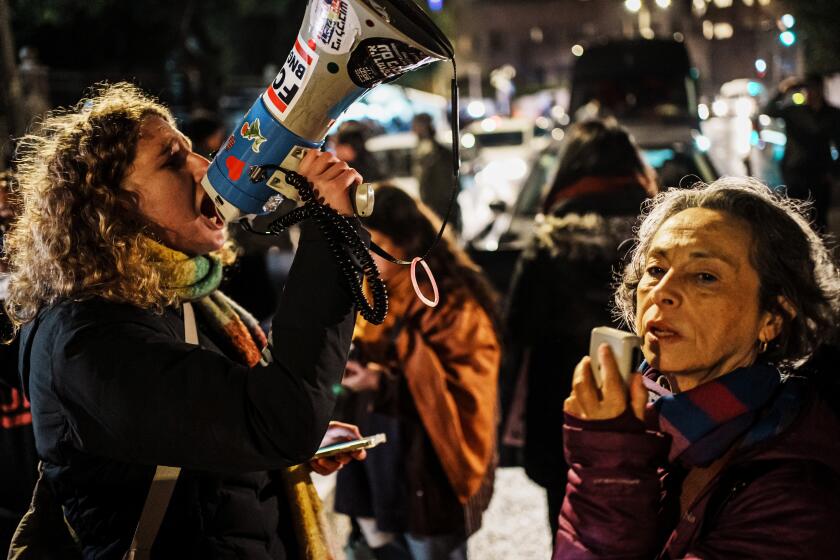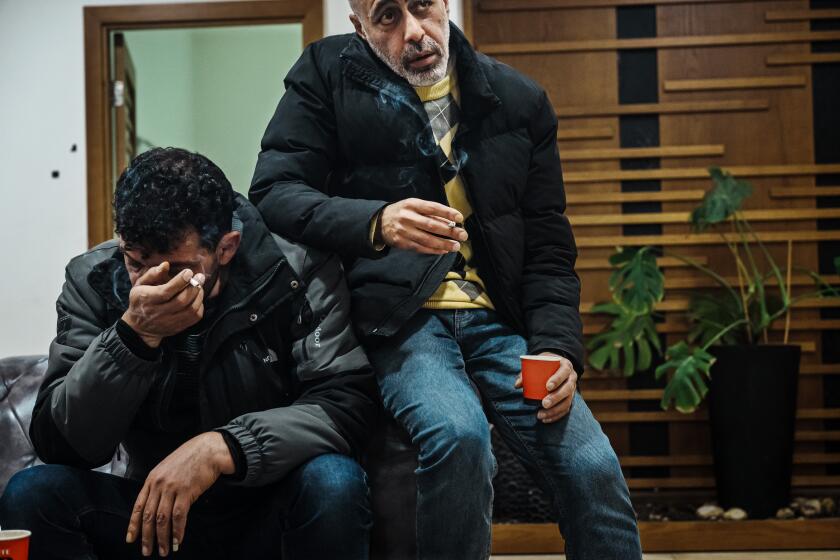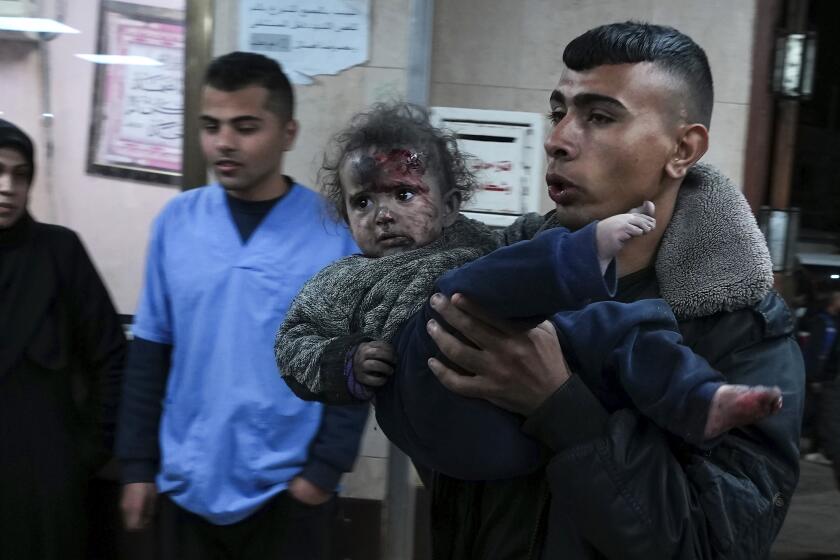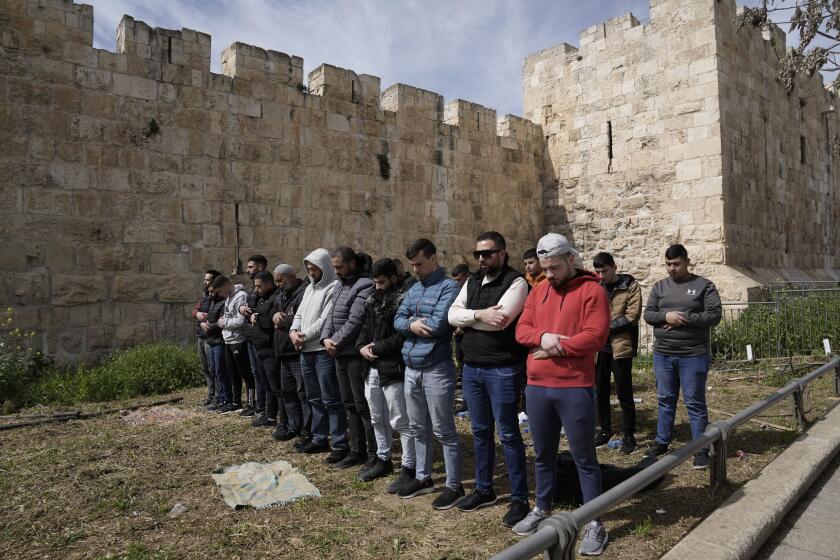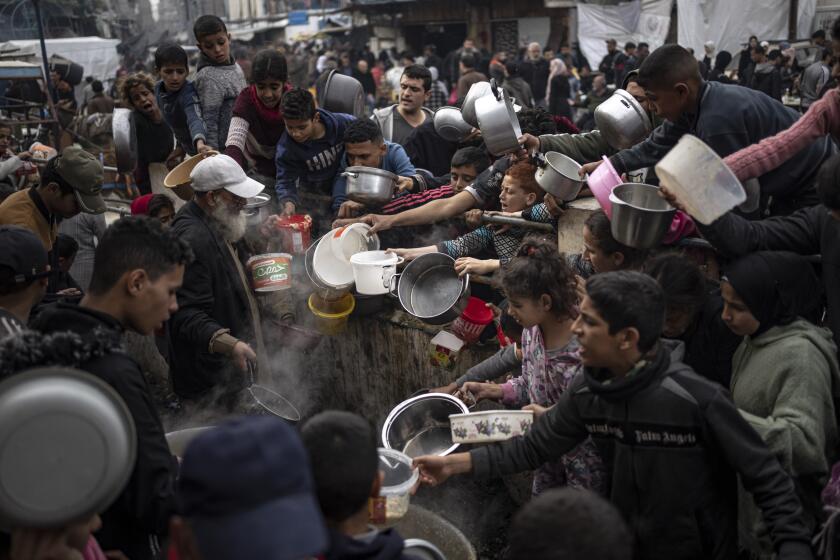Netanyahu rival’s visit to U.S. highlights cracks within Israel’s wartime leadership
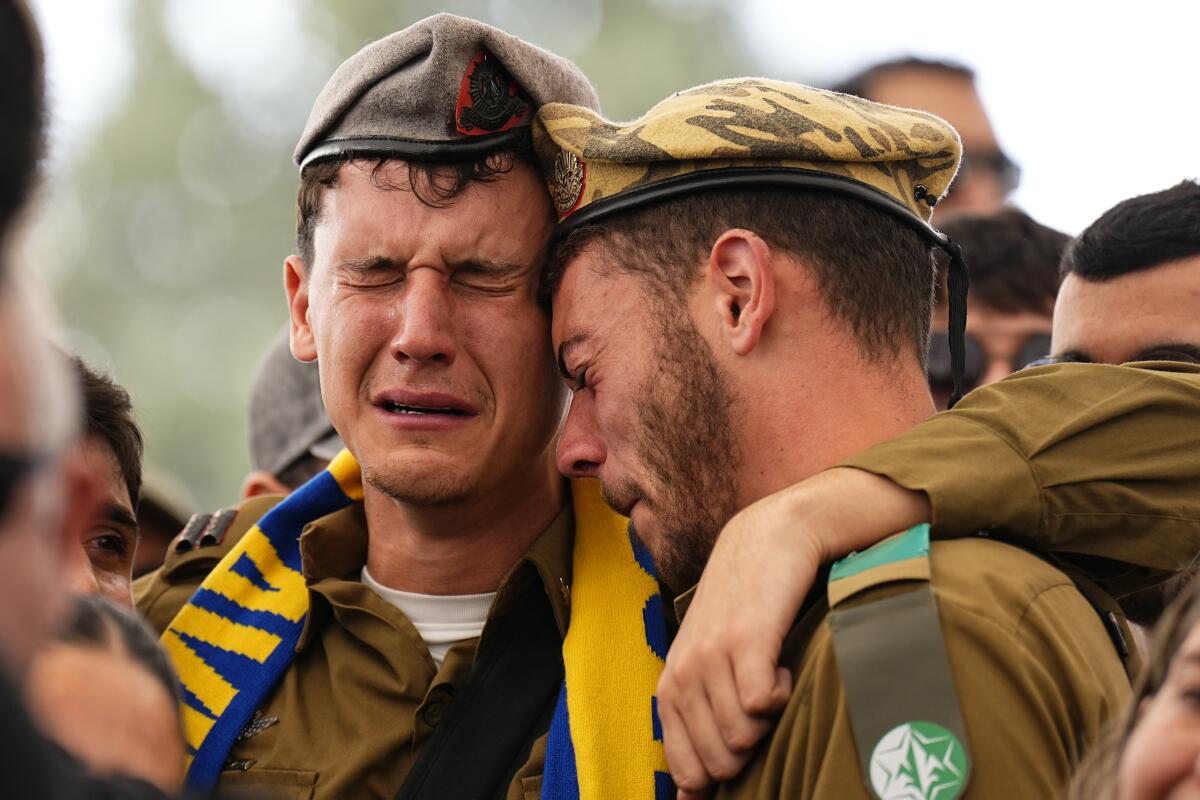
- Share via
TEL AVIV — Israeli Prime Minister Benjamin Netanyahu rebuked a top Cabinet minister arriving in Washington on Sunday for talks with U.S. officials, according to an Israeli official, signaling widening cracks within the country’s leadership nearly five months into its war with Hamas.
The trip by Benny Gantz, a centrist political rival who joined Netanyahu’s wartime Cabinet after Hamas’ Oct. 7 attack, comes as friction between the U.S. and Netanyahu is also rising over how to alleviate the suffering of Palestinians in Gaza and what the postwar plan for the enclave should look like.
An official from Netanyahu’s far-right Likud Party said Gantz’s trip was planned without authorization from the Israeli leader. The official, who spoke on condition of anonymity, said Netanyahu had a “tough talk” with Gantz and told him the country has “just one prime minister.”
More than three months into the Israel-Hamas war, the families of hostages held in Gaza have grown disillusioned with Israel’s military operations.
Gantz is scheduled to meet on Monday with U.S. Vice President Kamala Harris and national security advisor Jake Sullivan, according to his National Unity Party. A second Israeli official speaking on condition of anonymity said Gantz’s visit is intended to strengthen ties with the U.S., bolster support for Israel’s war and push for the release of Israeli hostages.
In Egypt, talks were underway to broker a cease-fire before the Muslim holy month of Ramadan begins next week.
Israel did not send a delegation because it is waiting for answers from Hamas on two questions, according to a third Israeli government official who spoke on condition of anonymity. Israeli media reported that the government is waiting to learn which hostages are alive and how many Palestinian prisoners Hamas seeks in exchange for each.
All three Israeli officials spoke anonymously because they weren’t authorized to discuss the giovernment disputes.
With family trapped in Gaza, two Palestinian friends in the West Bank hold each other up amid crushing grief.
On Saturday, the U.S. airdropped aid into Gaza. The airdrops came after dozens of Palestinians rushing to grab food from an Israel-organized convoy were killed last week. They circumvented an aid delivery system that has been hobbled by Israeli restrictions, logistical issues and fighting in Gaza. Aid officials say airdrops are far less effective than deliveries made via trucks.
U.S. priorities in the region have increasingly been hampered by Netanyahu’s Cabinet, which is dominated by ultranationalists. Gantz’s more moderate party at times acts as a counterweight to Netanyahu’s far-right allies.
Netanyahu’s popularity has dropped since the war broke out, according to most opinion polls. Many Israelis hold him responsible for failing to stop the Oct. 7 cross-border raid by Hamas, which killed about 1,200 people, mostly civilians, and took roughly 240 people as hostages into Gaza, including women, children and older adults, according to Israeli authorities.
Israel seeks control over security and civilian affairs in the Gaza Strip, according to a long-awaited postwar plan by Prime Minister Benjamin Netanyahu.
The subsequent fighting has killed more than 30,000 Palestinians, around two-thirds of them women and children, according to the Gaza Strip’s Health Ministry, which does not distinguish between civilians and fighters. Around 80% of the population of 2.3 million have fled their homes, and United Nations agencies say hundreds of thousands are on the brink of famine.
Israelis critical of Netanyahu say his decision-making has been tainted by political considerations, an allegation he denies. The criticism is particularly focused on plans for postwar Gaza. Netanyahu has released a proposal that would see Israel maintain open-ended security control over the territory with local Palestinians running civilian affairs.
The U.S. wants to see progress on the creation of a Palestinian state, envisioning a revamped Palestinian leadership running Gaza with an eye toward eventual statehood.
That vision is opposed by Netanyahu and the hard-liners in his government. Another top Cabinet official from Gantz’s party has questioned the handling of the war and the strategy for freeing the hostages.
As U.S. starts airdrops in Gaza, an EU agency says many Palestinians killed as they tried to get food from an aid convoy were hit by Israeli army fire.
Netanyahu’s government, Israel’s most conservative and religious ever, has also been rattled by a court-ordered deadline for a new bill to broaden military enlistment of ultra-Orthodox Jews, many of whom are exempted so they may pursue religious studies. Hundreds of Israeli soldiers have been killed since Oct. 7, and the military is looking to fill its ranks.
Gantz has remained vague about his view of Palestinian statehood. Polls show he would earn enough support to become prime minister if a vote were held today.
A visit to the U.S., if met with progress on the hostage front, could further boost Gantz’s support.
Israel has essentially endorsed a framework of a proposed Gaza cease-fire and hostage release deal, and it is now up to Hamas to agree to it, a senior U.S. official said Saturday. He spoke on condition of anonymity under ground rules set by the White House to brief reporters.
Israelis, deeply traumatized by Hamas’ attack, have broadly backed the war effort as an act of self-defense, even as global opposition to the fighting has increased.
But a growing number are expressing their dismay with Netanyahu. Some 10,000 people protested late Saturday to call for early elections, according to Israeli media. Such protests have grown in recent weeks, but remain much smaller than last year’s demonstrations against the government’s judicial overhaul plan.
Israel said many of the dead were trampled in a stampede for the food aid and that its troops only fired when they felt endangered by the crowd.
If the political rifts grow and Gantz quits the government, the floodgates will open to broader protests by a public that was already unhappy with the government when Hamas struck, said Reuven Hazan, a professor of political science at Jerusalem’s Hebrew University.
“There is a lot of anger,” he said, listing grievances that were building well before Oct. 7.
Meanwhile, at least 14 people were killed in a strike on a home in the southern Gaza city of Rafah on the Egyptian border, according to Dr. Marwan al-Hams, director of the hospital where the bodies were taken.
Israeli airstrikes also hit two homes in the Jabaliya refugee camp, a dense, residential area in northern Gaza, killing 17 people, according to the Civil Defense.
Amid concerns about the wider regional conflict, White House senior advisor Amos Hochstein was going to Lebanon on Monday to meet officials, according to an administration official who was not authorized to comment. White House officials want Lebanese and Israeli officials to prevent tensions along their border from worsening.
Goldenberg, Shurafa and Magdy reported from Tel Aviv, Rafah and Cairo, respectively. AP writers Melanie Lidman in Jerusalem and Aamer Madhani in Washington contributed to this report.
More to Read
Sign up for Essential California
The most important California stories and recommendations in your inbox every morning.
You may occasionally receive promotional content from the Los Angeles Times.
